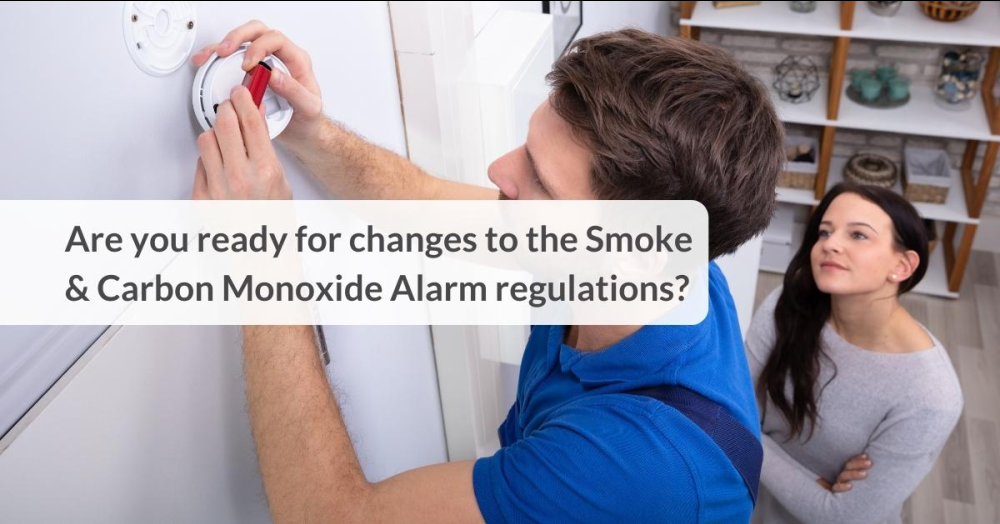
Landlords
The Department for Levelling Up, Housing and Communities (DLUHC) has announced new regulations will come into effect from 1st October 2022.
Current regulations
Since 1 October 2015, the current regulations require landlords to ensure that "at least one smoke alarm is installed on each storey of the premises on which there is a room used wholly or partly as living accommodation."
Landlords must also must put a carbon monoxide (CO) alarm in any room where a solid fuel is burnt such as coal, biomass or wood, including open fires. The regulations do not currently extent to gas, oil or LPG but it is highly recommended as good practice to ensure tenant safety. Sandersons UK have been recommending a CO alarm to all landlords with gas boilers and appliances as for a relatively small cost for a device with a long battery life you have the peace of mind your tenants are safe.
Landlords or their agents must ensure that the alarms work at the start of each new tenancy. This should be recorded on the inventory report.
The tenants are responsible for replacing batteries to ensure smoke alarms continue working for the duration of the tenancy.
Proposed NEW regulations
A UK Government consultation to extend the rules came to an end in January 2021.The following key changes will be made in England:
- Carbon monoxide alarms will be mandatory in rooms with a fixed combustion appliance such as gas/oil heaters and boilers (excluding gas cookers) in both private and social rented homes.
- Carbon monoxide alarms will also be mandatory upon installation of any heating appliance (excluding gas cookers) in all tenures through building regulations.
- Private and social landlords will be expected to repair or replace alarms once informed that they are faulty.
- Smoke alarms will be mandatory in all social rented homes.
Enforcement
The requirements are enforced by local authorities who can impose a fine of up to £5,000 where a landlord fails to comply with a remedial notice.
Smoke alarm type
There is no mention of a requirement for hard wired over battery powered. However, ideally we recommend hard wired with a battery backup for longevity compliant with British Standards BS 5839-6. Battery powered will suffice if checked regularly and batteries are replaced when needed or alarms with ‘sealed for life’ batteries. Alarms are best fitted to the wall or ceiling (following the installation instructions) to avoid them going missing.
Landlords should/must consider their duties under the Equality Act 2010. Specialist smoke alarms and carbon monoxide alarms that alert by vibration or flashing lights (as opposed to sound alerts) may be required for residents who are deaf or hard of hearing.
Carbon Monoxide alarm type
The regulations do not stipulate the type of alarms (such as mains powered (‘hard wired’) or battery powered) that should be installed.Landlords should make an informed decision and choose the type of carbon monoxide alarms based on the needs of their building and their tenants, and that those alarms are compliant with British Standards BS 50291.
Changing batteries
Landlords will be responsible for ensuring and recording that they work at check in. If tenants find that their alarms are not in working order during the tenancy, they are advised to arrange for the replacement of the batteries. Repairing or replacing any faulty alarms is the responsibility of the landlord. If the alarm still does not work after replacing the batteries, or if tenants are unable to replace the batteries themselves, they should report this to the landlord.
Installation
The regulations do not state exactly where alarms should be placed so please follow the manufacturer instructions. Your local fire and rescue authority may be able to provide further advice on installation or you can download fire safety information from www.gov.uk/firekills
Exemptions
The regulations apply to all social and private rented tenancies. The following tenancy types are excluded from the regulations:
- shared accommodation with a landlord or landlord’s family
- long leases
- student halls of residence
- hotels and refuges
- care homes
- hospitals and hospices
- low cost ownership homes
- other accommodation relating to health care provision
As with any change in legislation, we would urge all private landlords and registered providers of social housing who may not be compliant to conduct a property visit to check the alarms. This allows time to commence installations, repair systems or renew batteries immediately. There is a risk of fines for non compliance as soon as the regulations come into force.
